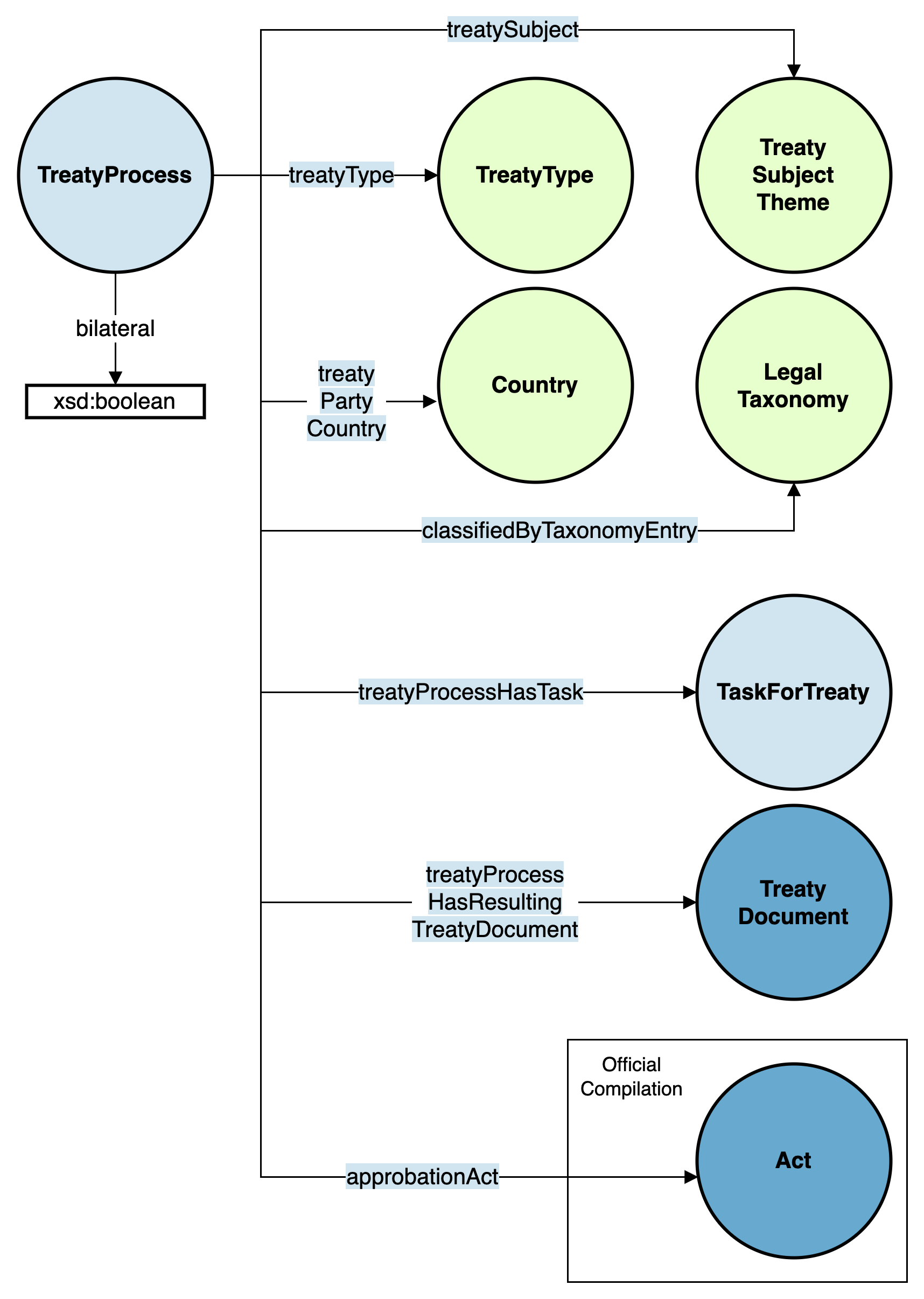International Treaties#
According to Termdat, an international treaty is an “international agreement concluded between states in written form and governed by international law, whether embodied in a single instrument or in two or more related instruments and whatever its particular designation”.
Hint for legal laypersons
International Treaties are sometimes but not always approbated into the Official Compilation.
Example#
Throughout this sub-page, the following treaty process is used as an example.
URI#
The URI of a treaty process contains the following parts:
Standard namespace and path:
https://fedlex.data.admin.ch/eli/the part
treaty/shows that it is about a treatyYYYY/is the year of the publicationIDan identifier that has no specific meaning
General Structure#
Treaties evolve around a jolux:TreatyProcess.
jolux:TreatyProcess
The owl:Class jolux:TreatyProcess is used group the important elements of an international treaty.
The following figure shows the general structure of a treaty process:

General structure of a treaty process.#
A jolux:TreatyProcess is described by the following properties:
jolux:bilateral
The datatype property jolux:bilateral is used to classify whether a treaty is bilateral. The datatype is xsd:boolean.
jolux:titleTreaty
The datatype property jolux:titleTreaty links to the title of the treaty. The datatype is rdf:langString.
jolux:treatySignatureDate
The datatype property jolux:treatySignatureDate links to the date of the signature of the treaty. The datatype is xsd:date.
jolux:treatySignaturePlace
The datatype property jolux:treatySignaturePlace links to the place of the signature of the treaty. The datatype is xsd:string.
Entities of class jolux:TreatyProcess have different jolux:TaskForTreaty added.
jolux:TaskForTreaty
The owl:Class jolux:TaskForTreaty is used as class for all the tasks that are necessary for concluding a treaty.
The tasks are linked to the process via jolux:treatyProcessHasTask.
jolux:treatyProcessHasTask
The object property jolux:treatyProcessHasTask links a jolux:TreatyProcess to a jolux:TaskForTreaty.
The possible types of tasks are given in the section SPARQL Example.
The result of an international treaty is always a jolux:TreatyDocument.
jolux:TreatyDocument
The owl:Class jolux:TreatyDocument is used for the resulting treaty of the jolux:TreatyProcess.
The jolux:TreatyDocument is linked via jolux:treatyProcessHasResultingTreatyDocument.
jolux:treatyProcessHasResultingTreatyDocument
The object property jolux:treatyProcessHasResultingTreatyDocument links a jolux:TreatyProcess to a jolux:TreatyDocument.
If there is an approbation into the Official Compilation The approbation act is linked to the treaty process via jolux:approbationAct.
jolux:approbationAct
The object property jolux:approbationAct links a jolux:TreatyProcess to a jolux:Act in the Official Compilation.
Datatype Properties for jolux:TreatyProcess#
Object Properties for jolux:TreatyProcess#
Object properties that point to a vocabulary entry:
Object properties that point to an individual:
SPARQL Examples#
The following SPARQL query shows all the different classes that are used on a jolux:TaskForTreaty to further segment these tasks:
PREFIX jolux: <http://data.legilux.public.lu/resource/ontology/jolux#>
SELECT DISTINCT ?class WHERE {
?task a jolux:TaskForTreaty;
a ?class.
FILTER(?class != <http://data.legilux.public.lu/resource/ontology/jolux#Event>)
}
The class jolux:Event is filtered because all jolux:TaskForTreaty are also jolux:Event.
The following SPARQL query shows the 100 newest treaties that have an English title with the approbation act if available:
PREFIX jolux: <http://data.legilux.public.lu/resource/ontology/jolux#>
SELECT * WHERE {
?treaty_process a jolux:TreatyProcess;
jolux:treatySignatureDate ?date;
jolux:titleTreaty ?title.
OPTIONAL {
?treaty_process jolux:approbationAct ?act.
}
FILTER(lang(?title) = "en")
FILTER(?title != ""@en)
}
ORDER BY DESC(?date)
LIMIT 100